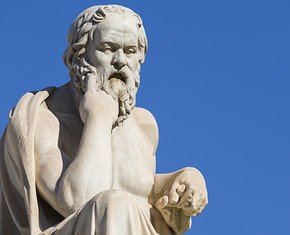The views expressed in our content reflect individual perspectives and do not represent the authoritative views of the Baha'i Faith.
I don’t know about you, but I’ve had some difficult conversations about climate change. Whether in person or on the web, people can get very heated about global warming.
Ironic, right? In some ways, we’re politically polarized, and that stark partisan divide sometimes determines our position on the reality of climate change, or the lack thereof. Personally, I’ve heard just about every possible position, from “Climate change is a total hoax” to “Climate change will catastrophically kill us all tomorrow.”
Luckily, most reasonable people do seem to be slowly moving toward a position somewhere in the middle of those two extremes, where anthropogenic climate change is recognized as a scientific and environmental reality; where its impacts are taken seriously, and where we all realize we have to do something about it now.
But regardless of that reasonable, scientifically-defensible position, the divide persists, and the partisan wrangling continues. The Baha’i teachings—especially and most specifically the November 2017 letter from the Universal House of Justice—ask us to adopt a moderate approach, and to engage everyone in respectful, truth-seeking dialogue on this critical global issue:
In those parts of the world where discussions surrounding anthropogenic climate change have indeed fallen prey to an almost intractable divide, Baha’is must be sensitive to the danger of this divisive partisan approach taking root in the community. This may well mean that some individuals or agencies have to consider to what extent their views about action required on climate change reflect a posture that is too extreme, whether in exaggerating the problem or minimizing it. Concepts and principles associated with Baha’i consultation inform how the friends should interact among themselves and how they participate in social discourses and social action. Consultation provides a means by which common understanding can be reached and a collective course of action defined. It involves a free, respectful, dignified, and fairminded effort on the part of a group of people to exchange views, seek truth, and attempt to reach consensus. An initial difference of opinion is the starting point for examining an issue in order to reach greater understanding and consensus; it should not become a cause of rancor, aversion, or estrangement. By acting in unity, a conclusion about a particular course of action may be tested and revised as necessary through a process of learning. Otherwise, as Abdu’l-Baha explains, “stubbornness and persistence in one’s views will lead ultimately to discord and wrangling and the truth will remain hidden.” – The Universal House of Justice, 29 November 2017, to a group of individual Baha’is.
This kind of open Baha’i consultation, for those who’ve never tried it before, may challenge us. Reaching consensus on emotional and polarizing issues can be tough. But an open attitude, a respect for the opinions of others and a process-centered approach can help overcome those barriers, and bring groups of people together in unity. A moderate approach, the Baha’i teachings tell us, will always work best:
Also relevant to such participation is greater appreciation and application of Baha’u’llah’s insights on moderation. “In all matters moderation is desirable,” He states. “If a thing is carried to excess, it will prove a source of evil.” This call for moderation includes in particular the manner of speech if a just conclusion is to be achieved. “Human utterance is an essence which aspireth to exert its influence and needeth moderation,” Baha’u’llah writes. “One word is like unto springtime causing the tender saplings of the rose-garden of knowledge to become verdant and flourishing, while another word is even as a deadly poison,” He explains. “It behoveth a prudent man of wisdom to speak with utmost leniency and forbearance so that the sweetness of his words may induce everyone to attain that which befitteth man’s station.” By moderation, Baha’u’llah is in no way referring to mere compromise, the dilution of truth, or a hypocritical or utopian consensus. The moderation He calls for demands an end to destructive excesses that have plagued humanity and fomented ceaseless contention and turmoil. Moderation in deliberation and action stands in contrast to the arbitrary imposition of views through power or insistence upon ideological aims, both of which obstruct the search for truth and sow the seeds of continuing injustice. A moderate perspective is a practical and principled standpoint from which one can recognize and adopt valid and insightful ideas whatever their source, without prejudice. “Whoso cleaveth to justice, can, under no circumstances, transgress the limits of moderation,” Baha’u’llah states. “He discerneth the truth in all things, through the guidance of Him Who is the All-Seeing.” – Ibid.
The Universal House of Justice closed their historic letter on climate change with an encouraging assertion—that we can, as “individuals, communities and institutions”—find ways to tackle the world’s hardest and most intractable problems:
The House of Justice trusts that, in pursuing the many facets of their work of community building, social action, and involvement in the discourses of society, individuals, communities, and institutions will continually grow in their capacity to make a distinctive and effective contribution to addressing the multitudinous problems afflicting society and the planet, including those associated with climate change. – Ibid.
















Comments
Sign in or create an account
Continue with Googleor